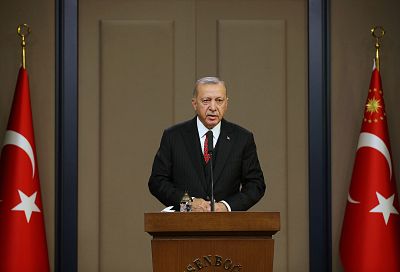"It seems that the policy of the United States is to betray their friends and allies," said the spokesperson for the Kurdish-led Syrian Democratic Forces
The U.S. decision to stand aside and allow Turkey to kick off a military operation in northeast Syria risks further destabilizing the war-torn region, undermining the fight against ISIS and sparking a wider conflict between Turkey and Kurdish fighters, analysts and Kurdish-led forces warned on Monday.
The U.S. military began moving its forces away from the Turkish border with northern Syria on Monday after the White House said Turkey would soon begin an operation there to create a buffer zone to move Syrian refugees to safety.
Syrian Kurds — who Turkey sees as a threat — currently control much of the area close to the border with Turkey, where Ankara hopes to create a so-called safe zone. But the U.S. has relied on Kurdish fighters who lead the Syrian Democratic Forces (SDF) as its most effective partner in the fight against ISIS in Syria.
Michael Stephens, a research fellow at the Royal United Services Institute, a London-based think tank said he was not altogether surprised by the U.S. decision and warned it could have far-reaching consequences for the region.
News
"Ultimately the question was not if the US would withdraw, but when and how," he said. "More concerning of course is how the fight against ISIS is run from this moment on."
"It is difficult to see how this agreement does anything other than give Turkey a carte Blanche to socially engineer Kurdish majority areas of north east Syria," Stephens added.
The Kurdish fighters have been instrumental in fighting against ISIS in the group's former strongholds like Raqqa. They currently hold thousands of ISIS fighters in prison camps, many of them foreigners whom Western powers have refused to take back.
President Donald Trump repeated his assertion Monday morning that ISIS had been defeated.
But in its most recent quarterly annual report on U.S. operations in Syria, released in August, the Defense Department's inspector general said that "ISIS remains a threat in Iraq and Syria."
Stephens said he expected to see further conflict between Turkey and Kurdish fighters that could spread beyond Syria's borders.
"It'll spread across Iraq, Syria and Turkey," he said.
In the U.S., Republicans and Democrats have warned that allowing a Turkish military operation across the border could lead to a massacre of the Kurds and send a troubling message to American allies across the globe.
"Allowing Turkey to move into Northern Syria is one of the most destabilizing moves we can do in the Middle East. The Kurds will never trust America again," tweeted Ruben Gallego, a Democrat congressmen for Arizona who served in Iraq.
The SDF accused the U.S. on Monday of betrayal and abandoning them to Turkish "genocide."
"It seems that the policy of the United States is to betray their friends and allies," said Mustafa Bali, the spokesperson for the SDF on Monday.
"The Americans promised from their side to stand with us and to protect us from and threat that comes from Turkey," he said, adding that the Americans were now allowing "the Turks to commit a huge genocide against us."
Safe zone push
Turkish President Tayyip Erdogan has pushed to create a safe zone in northeast Syria for months and until now the U.S. government has pushed back, as it attempted to balance its commitment to its Kurdish allies and its relationship with Turkey.
U.S. officials in the region and the Pentagon have previously urged the White House not to abandon the SDF. Last December, Trump declared he would pull out all 2,000 U.S. troops from Syriaadding that ISIS had been defeated. Then-Defense Secretary Jim Mattis and then-special presidential envoy for the coalition to defeat ISIS, Brett McGurk, both resigned.
McGurk, now an NBC News foreign affairs analyst, tweeted Sunday that "tonight is a sad replay but seems even worse as US officials since convinced the SDF that we planned to stay."
The Turkish government has long-seen the SDF as a threat linked to the PKK, a Kurdish group in Turkey that has waged a decades-long insurgency against the government and is considered a terrorist group by the United States.












